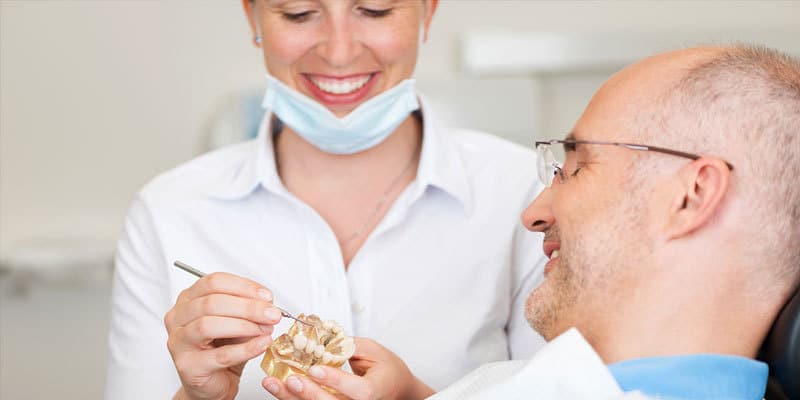- What is a dental crown?
- Do I really need a crown?
- How long do dental crowns last?
- Are there ever dental crown problems?
- How to care for dental crowns
If you ever hear your dentist say, “I’m going to crown you!”, there’s no need to be afraid. They very likely mean that they’re going to use a dental crown to restore a broken tooth, hold a dental bridge in place, or otherwise repair your teeth so you can smile with confidence again.
What is a dental crown?
Much like the name suggests, a dental crown is a tooth-shaped “cap” that’s placed over your tooth. It’s used to restore the appearance of the tooth so it looks brand new, and protects the tooth underneath from damage.
Dental crowns are generally made with metals, such as gold, palladium, nickel, or chromium so the crown is strong enough to withstand the pressure of biting and chewing. Because of their metallic colour, many people use them for out-of-sight teeth toward the back of the mouth. For more visible teeth, many people opt to have a porcelain layer fused on top of the metal crown. The porcelain can be coloured to match the teeth on either side for a more natural look.
Another option are tooth crowns completely made of porcelain or ceramic. These are best for people with metal allergies, and can be coloured to match the adjacent teeth. However, in some instances these crowns aren’t as strong as their metal counterparts, and can chip or crack more easily.
Do I really need a crown?
Depending on your particular situation, your dentist might recommend using a dental crown as the best way to:
- Restore a broken tooth
- Protect a weak, cracked, or decayed tooth from further damage
- · Hold a dental bridge in place
- · Cover a dental implant, teeth with large fillings, or teeth that are discoloured, misshapen, or have been treated with a root canal
At the time of your consultation, your dentist will assess whether to use a traditional crown or an onlay. Onlays don’t cover as much of the underlying tooth as traditional crowns, and are sometimes used if the tooth’s solid structure still remains.
Creating and placing your dental crown
Generally speaking, two visits to the dentist over the course of a few weeks are required to complete the dental crown procedure.
After the dentist has determined that your tooth requires a crown, it will have to be filed down across the top and sides in order to ensure there is enough room for the crown to fit properly. All-porcelain and porcelain-fused crowns require more room than metal crowns, so more of the tooth will have to be filed in order to accommodate them. In some cases, if tooth decay has left too much of the tooth missing, your dentist will use a filling material to build up the tooth structure.
The next step is to use paste or putty to make an impression of the tooth receiving the crown. Impressions of the teeth above/below the tooth are also made, to ensure that the crown will not affect your bite. At Yonge Eglinton Dental we have a digital scanner, so in most cases, we are able to take all impressions digitally.
The impressions are then sent to a dental laboratory to be manufactured. Before you leave the office, your dentist will cover the treated tooth with a temporary crown to protect it over the next few weeks while your permanent crown is being made.
At your second dental visit, your dentist will remove the temporary crown and place the permanent crown on your tooth to check for fit and colour. Provided that the dentist is pleased with crown, the new crown is then permanently cemented in place.
Your dental team will prioritize your comfort throughout the procedure, and will take steps to alleviate any anxiety you may experience. Be sure to openly discuss any questions or concerns that you may have about any dental procedure with your dentist or dental team.
How to care for dental crowns
The good news about crowns is that they don’t require any special treatment. Just as you would with your normal teeth, simply brush twice per day and floss once per day, especially around the area of the crown where the tooth meets the gum. This will help protect the underlying tooth from tooth decay or gum disease.
Are there ever dental crown problems?
Tooth crowns are a safe and effective way to protect teeth. However, there are sometimes problems to keep an eye out for, such as:
- Chipped crown: All-porcelain or porcelain-fused crowns can chip. A small chip can usually be repaired with the crown still in the mouth, but large or multiple chips may result in your crown needing to be replaced.
- Loose dental crown: A loose crown can signal that the cement has begun to wash away. To prevent bacteria from attacking the underlying tooth, see your dentist if your crown feels loose.
- Crown that has fallen off: If this happens, make an appointment to see your dentist right away. They’ll give you instructions on how to care for your tooth in the meantime, and determine at your appointment if the crown can be cemented back on, or needs to be replaced with a new crown.
- Pain or discomfort: Some discomfort may occur after your crown has been completed. However, if you’re experiencing hot and cold sensitivity, your dentist may recommend brushing your teeth with a sensitivity-tooth toothpaste. If you’re experiencing discomfort when you bite down, your crown might need a little adjustment so it sits lower on the tooth. Your dentist can fix this quite easily.
It should also be noted that a dark line between the tooth crown and gumline is normal, especially if you have a porcelain-fused crown. The dark line is the metal beneath the porcelain showing through, and is of no cause for concern.
How long do dental crowns last?
Typically, if you properly care for your dental crown, it should last anywhere from between five to 15 years. Some of our habits may diminish the crown’s lifespan, such as grinding or clenching your teeth, biting your fingernails, and using your teeth to open packages or bottles.
We want you to have confidence in your oral health for a lifetime. Dental crowns – along with regular dental checkups and a proper at-home oral health routine – can help you have a smile fit for a king or queen!
Dental crowns at Yonge Eglinton Dental in Toronto
Even if you don’t need a crown, Yonge-Eglinton Dental will treat you like royalty! We’ll have a look at your teeth and help you determine the best path to preserve your oral health and protect your smile for years to come.
If you need help with dental crowns, or want to book a routine dental checkup, give Yonge Eglinton Dental a call today at 416-932-2222 or visit us online to book an appointment. We’d love to see you!
Concerned about visiting the dentist? Read about how we protect the health and safety of our patients and staff so your family can seek proper dental care with peace of mind.








